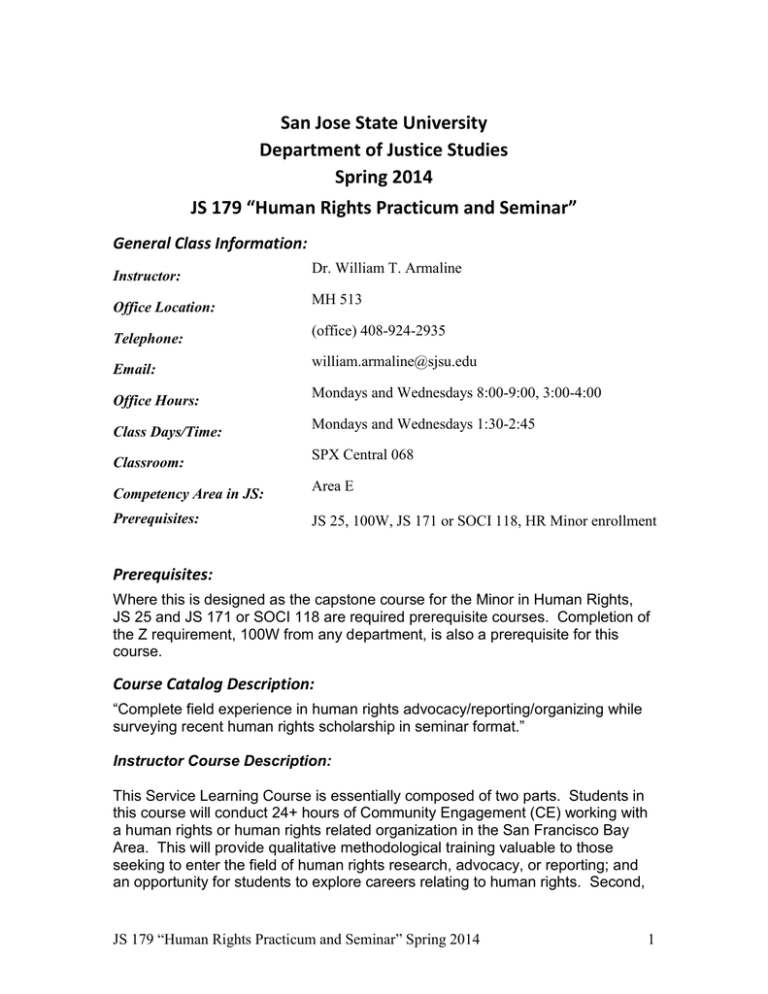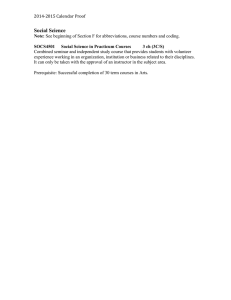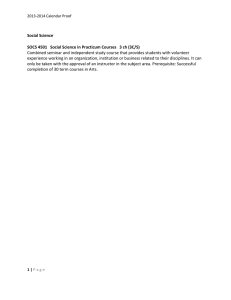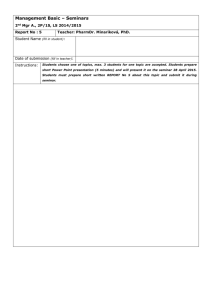San Jose State University Department of Justice Studies Spring 2014
advertisement

San Jose State University Department of Justice Studies Spring 2014 JS 179 “Human Rights Practicum and Seminar” General Class Information: Instructor: Office Location: Telephone: Email: Office Hours: Class Days/Time: Classroom: Competency Area in JS: Prerequisites: Dr. William T. Armaline MH 513 (office) 408-924-2935 william.armaline@sjsu.edu Mondays and Wednesdays 8:00-9:00, 3:00-4:00 Mondays and Wednesdays 1:30-2:45 SPX Central 068 Area E JS 25, 100W, JS 171 or SOCI 118, HR Minor enrollment Prerequisites: Where this is designed as the capstone course for the Minor in Human Rights, JS 25 and JS 171 or SOCI 118 are required prerequisite courses. Completion of the Z requirement, 100W from any department, is also a prerequisite for this course. Course Catalog Description: “Complete field experience in human rights advocacy/reporting/organizing while surveying recent human rights scholarship in seminar format.” Instructor Course Description: This Service Learning Course is essentially composed of two parts. Students in this course will conduct 24+ hours of Community Engagement (CE) working with a human rights or human rights related organization in the San Francisco Bay Area. This will provide qualitative methodological training valuable to those seeking to enter the field of human rights research, advocacy, or reporting; and an opportunity for students to explore careers relating to human rights. Second, JS 179 “Human Rights Practicum and Seminar” Spring 2014 1 the course will consist of a graduate-style scholarly seminar where students will reflect on and share their field experiences with others, and critically engage relevant, recent scholarship in the field of human rights. Course Goals and Student Learning Objectives: The goals of this course are to (1) give students an opportunity to explore applied careers in human rights advocacy, law, research, reporting, and/or organizing; (2) provide valuable training in ethnographic and qualitative research methods; (3) expose students to cutting edge scholarship and advocacy in the field of human rights; (4) prepare students for graduate level coursework, where students reflect on their experiences in relation to course readings and recent, relevant research. Upon successful completion of this course, students should be able to: (SLO1) Collect and apply direct observational field notes as qualitative data to an analysis of contemporary human rights advocacy/reporting/organizing. (SLO2) Work with other students (team) and an organizational supervisor to complete and assess a tangible Community Engagement project of mutual design. (SLO3) Review, apply and critique the most recent scholarly literature in the field of Human Rights from journals such as Human Rights Quarterly, Societies Without Borders, and the Journal of Human Rights. (SLO4) Exhibit familiarity with local and national Human Rights organizations, advocacy networks, and policy campaigns. Required Texts: None. All readings will be provided by instructor (PDF via email). Suggested, Related Readings and Resources for Further Reference and Research: Human Rights Documents and Reporting (International Law): Center for the Study of Human Rights. (2001). 25+ Human Rights Documents. NY:CSHR. Amnesty International: More information on Amnesty International can be found at: http://www.amnesty.org. Human Rights Watch: More information on Human Rights Watch can be found at: http://www.hrw.org. JS 179 “Human Rights Practicum and Seminar” Spring 2014 2 United Nations: More information on United Nations can be found at: http://www.un.org/rights. Library Liaison: For help with library resources and library research (including the use of databases and online research materials—such as journal search engines), students are strongly encouraged to contact the Justice Studies Library Liaison: Nyle Monday, Nyle.Monday@sjsu.edu, (408) 808-2041. Classroom Protocol: 1. This course depends on participation and interaction. Students are expected to be on time to class out of respect for your colleagues and instructor. 2. All classroom participants are expected to foster an environment that encourages participation, rather than silencing others (be respectful to one another, do not insult or intimidate others, and so forth). 3. Students are expected to complete all readings and assignments by the dates indicated on the syllabus. 4. Students are responsible for any and all notes and materials missed in their absence. 5. Cell phone, PDA, and Laptop/Internet use will not be tolerated during class time unless they are part of class activities or necessary to field an emergency. Adding and Dropping: Students are responsible for understanding the policies and procedures about add/drops, academic renewal, etc. Information about add/drops is available at: http://info.sjsu.edu/web-dbgen/narr/soc-fall/rec-324.html. Information about late drops is available at: http://www.sjsu.edu/sac/advising/latedrops/policy/. Students should be aware of the current deadlines and penalties for adding and dropping classes. Assignments and Grading Policy: Readings Students are expected to complete readings by the class session indicated on the course schedule. Students should come to class prepared to discuss the assigned readings such that class time is not wasted, and we can engage the material together. Classroom Activities and Discussion: Though not graded per se, this course requires a great deal of classroom discussion and classroom activity. This is primarily because much of the course material is often new and challenging for undergraduate students. These discussions and classroom activities are designed to help students successfully JS 179 “Human Rights Practicum and Seminar” Spring 2014 3 achieve all learning objectives (SLO 1, 2, 3 and 4), and reflect upon their experiences in the field (CE). Reading Reflection Papers (SLO3, SLO4) 40%: Description and Purpose: The course reader is essentially a collection of some of the most provocative and locally relevant scholarship in the multidisciplinary field of human rights in the past five years. Each week, students should complete a 2-page reflection paper (typed, 12-point font, normal margins, double spaced, citations in APA format— though no outside research, title page, or running headers necessary) based on the assigned readings for that week. Each reflection paper should consist of three parts: 1) Summary, 2) Critique, 3) Discussion questions. We will use these papers to generate discussion as peers in class. Further, this format mimics the basic design of graduate courses in the social sciences, and will help develop students’ ability to digest and employ challenging material. Grading: These assignments will be graded on a 10-point scale, based on a standard rubric by the instructor (will be distributed in class). Reflection papers will be worth 40% of the final course grade. Critical Engagement (CE) Field Notes (SLO1, SLO2) 20%: Description and Purpose: Please see the detailed handout, “Community Engagement (CE) Projects and Assignments” for details on the CE portion of this Service Learning course. This document, along with all other required paperwork (Service Learning Agreement and individual Service Learning Plan/Contract) will be distributed and discussed on the first day in class. That said, you will complete two graded assignments in the process of your CE work. The first of which are your Field Notes—you might think of these as a structured journal where you are collecting qualitative data on your partnered organization and CE project. Your Field Notes should be completed for every day you spend on-site with your organization and team to complete your CE project. Though we will discuss Field Notes more in class, each entry should include the following: (1) What did you and your team do that day? (2) What did you and your team learn that day? (3) Were there any crucial observations made about the organization or project? Explain. (4) How many hours did you log that day? Grading: Though your Field Notes will be checked periodically for progress through classroom activities (see schedule), you will turn them in on the day of your assigned Sociological Analysis presentation. You may keep your Field Notes in a hand written journal or electronic file. At any rate, your Field Notes should be clear, legible, and organized at the time of submission. They will be evaluated JS 179 “Human Rights Practicum and Seminar” Spring 2014 4 based on the perceived level of effort, and the thoroughness and depth of your notes/reflections. Your Field Notes will be worth 20% of the final course grade. NOTE: students who would like to combine their field site with other internships or service learning courses should approach and inform the JS 179 instructor in the first week of class. Please remember that formal internships and service learning courses require documentation and liability agreements. Students should see their faculty internship or service-learning supervisors in their respective major departments for further information on the necessary paperwork. Community Engagement Sociological Analysis Presentations (SLO1, SLO2) 40%: Description and Purpose: These presentations are designed to summarize and reflect upon your CE project, and share this information/experience with other students in the course. In a multimedia presentation of your/your team’s design, critically describe and assess the organization’s history, mission, programs, funding, staffing, operations, and outcomes/community impact as they have to do with defining and/or realizing human rights practice in the U.S. Your presentations should be approximately 30 minutes in length, with 10 minutes allotted for class discussion facilitated by those presenting. We will discuss these presentations further in class, where students will also receive a sample grading rubric. Grading: Presentations will be graded on a 30-point scale, based on a standard rubric by the instructor (will be distributed in class). Sociological Analysis presentations will be worth 40% of the final course grade. Grading Scale Final grades will be calculated as a percentage on a typical “10-point letter grade scale”: 98-100% 94-97 90-93 88-89 84-87 80-83 78-79 74-77 70-73 68-69 64-67 60-63 A+ A AB+ B BC+ C CD+ D D- JS 179 “Human Rights Practicum and Seminar” Spring 2014 5 <60 F University Policies: Academic Integrity: Students should know that the University’s Academic Integrity Policy is available at: http://www.sa.sjsu.edu/download/judicial_affairs/Academic_Integrity_Policy_S072.pdf. Your own commitment to learning, as evidenced by your enrollment at San Jose State University and the University’s integrity policy, require you to be honest in all your academic course work. Faculty members are required to report all infractions to the office of Student Conduct and Ethical Development. The website for Student Conduct and Ethical Development is available at http://www.sa.sjsu.edu/judicial_affairs/index.html. Instances of academic dishonesty will not be tolerated. Cheating on exams or plagiarism (presenting the work of another as your own, or the use of another person’s ideas without giving proper credit) will result in a failing grade and sanctions by the University. For this class, all assignments are to be completed by the individual student unless otherwise specified. If you would like to include in your assignment any material you have submitted, or plan to submit for another class, please note that SJSU’s Academic Policy F06-1 requires approval of instructors. Campus Policy in Compliance with the American Disabilities Act: If you need course adaptations or accommodations because of a disability, or if you need to make special arrangements in case the building must be evacuated, please make an appointment with me as soon as possible, or see me during office hours. Presidential Directive 97-03 requires that students with disabilities requesting accommodations must register with the DRC (Disability Resource Center) to establish a record of their disability. Student Technology Resources: Computer labs for student use are available in the Academic Success Center located on the 1st floor of Clark Hall and on the 2nd floor of the Student Union. Additional computer labs may be available in your department/college. Computers are also available in the Martin Luther King Library. A wide variety of audio-visual equipment is available for student checkout from Media Services located in IRC 112. These items include digital and VHS camcorders, VHS and Beta video players, 16 mm, slide, overhead, DVD, CD, and audiotape players, sound systems, wireless microphones, projection screens and monitors. Learning Assistance Resource Center: The Learning Assistance Resource Center (LARC) is located in Room 600 in the Student Services Center. It is designed to assist students in the development of their full academic potential and to motivate them to become self-directed learners. The center provides support services, such as skills assessment, JS 179 “Human Rights Practicum and Seminar” Spring 2014 6 individual or group tutorials, subject advising, learning assistance, summer academic preparation and basic skills development. The LARC website is located at: http:/www.sjsu.edu/larc/. SJSU Writing Center: The SJSU Writing Center is located in Room 126 in Clark Hall. The Writing Center is staffed by professional instructors and upper-division or graduate-level writing specialists from each of the seven SJSU colleges. Our writing specialists have met a rigorous GPA requirement, and they are well trained to assist all students at all levels within all disciplines to become better writers. The Writing Center website is located at: http://www.sjsu.edu/writingcenter/about/staff/. Peer Mentor Center: The Peer Mentor Center is located on the 1st floor of Clark Hall in the Academic Success Center. The Peer Mentor Center is staffed with Peer Mentors who excel in helping students manage university life, tackling problems that range from academic challenges to interpersonal struggles. On the road to graduation, Peer Mentors are navigators, offering “roadside assistance” to peers who feel a bit lost or simply need help mapping out the locations of campus resources. Peer Mentor services are free and available on a drop –in basis, no reservation required. The Peer Mentor Center website is located at: http://www.sjsu.edu/muse/peermentor/. JS 179 “Human Rights Practicum and Seminar” Spring 2014 7 Course Schedule JS 179 “Human Rights Practicum and Seminar” Spring 2014 Note: The following course schedule is subject to change with fair notice. Week. 1. Date. 1/27 1/29 2. 2/03 2/05 Topics, Readings, Assignments, Deadlines. Introduction to course and explanation of syllabus, collect student interests to assign appropriate readings. Distribute all student paperwork for completion by 2/10. Getting familiar with Local HR Organizations and Campaigns, guest presentations. Ethnographic methods and HR advocacy, reporting, and research part 1 2/10 Ethnographic methods and HR advocacy, reporting, and research part 2; How to dissect a journal article. Scholarship seminar (instructor led); read article 2; assign presentation dates; Service Learning Agreements and Student Learning Plans/Contracts Due. 2/12 CE Fieldwork 4. 2/17 Scholarship seminar; read article 3 CE Fieldwork 5. 2/19 2/24 CE Fieldwork 6. 2/26 3/03 3. 3/05 Scholarship seminar: read article 4 Checking in on field work; informal discussion of placements and progress CE Fieldwork Scholarship seminar; read article 5 7. 3/10 CE Fieldwork 8. 3/12 3/17 9. 3/19 3/24 CE Fieldwork SPRING RECESS 3/26 SPRING RECESS Film TBA JS 179 “Human Rights Practicum and Seminar” Spring 2014 8 Week. 10. 11. Date. Topics, Readings, Assignments, Deadlines. 3/31 CESAR CHAVEZ DAY (CAMPUS CLOSED) 4/02 CE Fieldwork Checking in on field work; informal discussion of placements and progress 4/07 4/09 CE Fieldwork Scholarship seminar; read article 6 12. 4/14 CE Fieldwork 13. 4/16 4/21 CE Fieldwork 14. 4/23 4/28 CE Fieldwork 15. 4/30 5/05 Sociological Analysis Presentations, Field Notes Due 16. 5/07 5/12 . Place and Time: N/A Final Exam . Film TBA Scholarship seminar; read article 7 Sociological Analysis Presentations, Field Notes Due Wrap-up, Thank-you’s to partnered organizations, and making use of your CE projects. JS 179 “Human Rights Practicum and Seminar” Spring 2014 9




